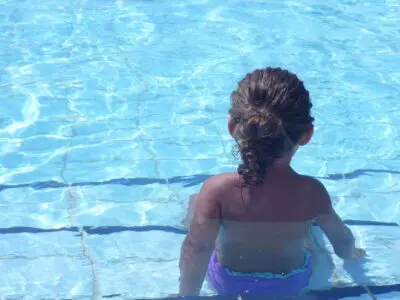Georgia’s Swimming Pool Laws and Accident Liability

Safety requirements for swimming pools are covered in the Rules and Regulations of the State of Georgia in Chapter 511-3-5. This chapter contains regulations concerning everything from the pool’s construction to filters to diving boards to lifeguards. Pool stairs, ladders, diving equipment, slides, circulation systems, disinfectant equipment, entryways, and exits all must conform to certain specifications.
Owners and operators of public and private pools must abide by these requirements. Property owners must acquire a permit before installing an above-ground swimming pool. An inspector will visit the site to inspect the work. Among other conditions, all pools two feet or more deep must be contained within a lockable fence at least four feet high. When lifeguards are provided, they must hold current, nationally recognized certifications in lifeguarding and in first aid and CPR.
How Do Accidents Occur Due to Failing to Meet Pool Requirements?
Pool owners have a duty to maintain their pools and the surrounding areas in a reasonably safe condition and to warn guests or visitors of any existing hazards. When they fail to do so, or state rules and regulations are not followed, swimming pool accidents can happen in a number of ways, including:
- Slips and falls caused by hazards such as uneven pool decks or wet, slippery surfaces.
- Diving injuries caused by improper diving in shallow water.
- Child drownings when swimming pools are not properly fenced to prevent children from entering.
- Injuries caused by defective or improperly maintained diving boards.
- Drownings or near drownings due to inattentive lifeguards or lack of signs to warn guests that no lifeguard is present.
- Entrapment caused by poorly maintained or missing anti-entrapment devices.
- Injuries caused by damaged or missing pool ladders.
Public and private pool owners may be held liable when accidents and injuries result from their failure to maintain the property in a reasonably safe condition and/or failure to comply with Georgia’s rules and regulations concerning swimming pools.
How Common Are Swimming Pool Accidents and Injuries?
Drowning or near drowning are among the most common swimming pool injuries. The Consumer Product Safety Commission announced that fatal and non- fatal drownings among children under 15 remain high, as reported in a news release.
- Child drownings are the leading cause of unintentional death among children ages one to four.
- From 2017 through 2019, an average of 389 pool or spa-related fatal drownings per year occurred in the U.S. among children younger than 15.
- A total of 6,800 pool or spa-related injuries among children younger than 15 were treated in hospital departments in 2021.
- From 2019 through 2021, 80% of children treated in emergency departments for pool or spa-related non-fatal drownings were younger than age five.
- Two-thirds of fatal child drownings in pools or spas occurred in residential settings.
- Of non-fatal pool or spa drowning incidents among children under the age of five that led to emergency room visits, 27% occurred in public locations, and 73% occurred at a residence.
How Can an Atlanta Personal Injury Lawyer Help After a Serious Swimming Pool Accident?
If you were injured or lost a loved one in a swimming pool accident caused by the negligence of a public or private pool owner, our Atlanta personal injury attorneys can help you pursue compensation for your losses and hold the responsible parties accountable. We can investigate the accident to determine fault and liability, calculate the full extent of your damages, negotiate with insurance companies for a fair settlement, and fight for the compensation you deserve in front of a jury if necessary.
We can use our knowledge, skills, and resources to aggressively pursue a full recovery. Contact Grant Law Office at (404) 995-3955 to discuss your Atlanta premises liability claim.
Contact us today for a free and comprehensive case evaluation.
We require no legal retainer or upfront fees,
and you pay nothing unless we prevail.
Phone: (404) 995-3955




